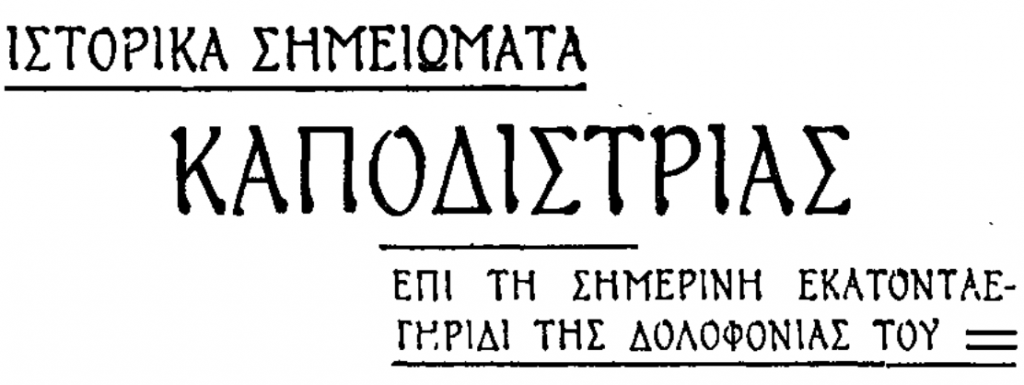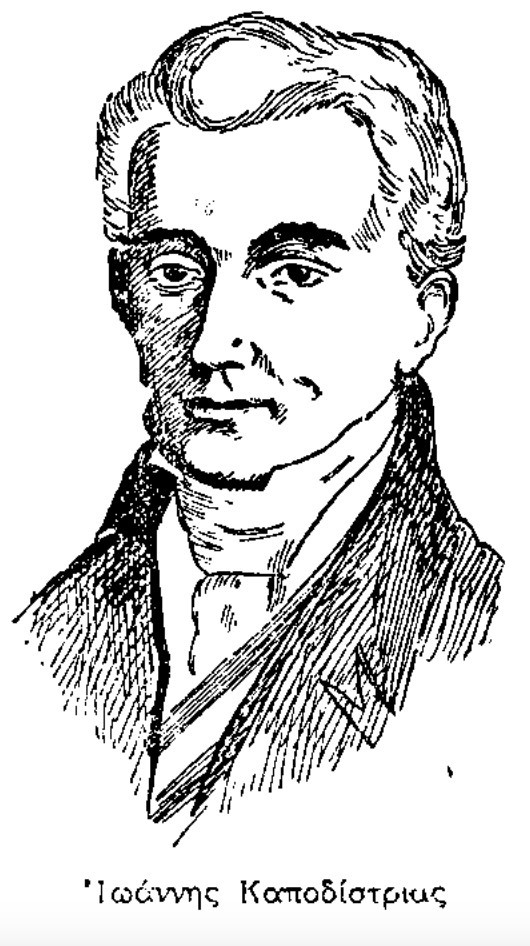In 27 September 1831, Ioannis Kapodistrias, the first Governor of Greece and a figure who had contributed enormously to the Greek people’s struggle for freedom and independence, was assassinated in Nafplio by Konstantinos and Georgios Mavromichalis.
As Kostas Kairofylas relates in the Eleftheron Vima of 25 September 1931:
‘On the evening of 26 September 1831, Kapodistrias sat down to write to his friend Eynard, who was also a great philhellene. His soul must have succumbed to momentary disappointment, but his letter is full of patriotic bravery nonetheless, which shines a light on the true Kapodistrias:
“Neither the fear of plots and intrigue, nor what the newspapers write, will make me deviate from the route I have taken. Let them write, let them say what they will, but in the end, men are not judged by what is written or said against them, but by the testimony of their deeds. Strengthened by this conviction, I have lived by these principles till now, and they have served me well. So it would be quite impossible to change direction at this juncture. Come what may, I shall do my duty!”

ELEFTHERON VIMA, 25.9.1931, TO VIMA | TA NEA Historical Archive
‘Early the next morning, as was his wont, he left his home to attend matins in the church of Saint Spyridon. The two Mavromichalis brothers, Konstantinos and Georgios, were waiting for him outside. They leaped upon him, one brother smashing a pistol butt into the head, the other plunging a knife into his belly. Without so much as uttering a sound, he fell dead to the ground.
‘Greece had lost its re-creator, its most distinguished son, its great Governor.
‘The Mavromichalis brothers provided the hands that committed the crime. But the moral responsibility lies elsewhere, with the real assassins. With those who envied his work, who undermined his patriotic actions out of selfishness or base self-interest. One might even say the Mavromichalis brothers, who paid for the crime with their lives, bore the least guilt of all. They at least had an excuse: the imprisonment of their father, a state of affairs Kapodistrias’ enemies had exploited to exhort them to commit this murderous act. Kapodistrias was murdered by foreign diplomacy, by a handful of land-owners, and by the intelligentsia. The common people adored him and bear no responsibility whatsoever for the crime.’
Kolokotronis’ reaction
Spyros Mellas’ account of the life of Kolokotronis, which is based in turn on the Old Man of the Morea’s own memoirs and was published in the ELEFTHERON VIMA in 1931, contains interesting information about the aftermath of the assassination and the stance taken by Theodoros Kolokotronis.
‘Kolokotronis was in Tripolitsa when Kapodistrias was assassinated. He wept sincerely for his friend. Summoned for an extraordinary session, the Senate resolved to appoint a three-member government, to consist of: Augustinos, the Governor’s brother, Kolokotronis and Kolettis. Augustinos declared that if the Old Man didn’t accept, neither would he. They sent a messenger to Kolokotronis to pass on the news. The Old Man was hesitant:
‘”I did not know where to go or what to do, nor had a clear picture of what was happening in the capital, Nafplio”, he writes in his autobiography.
‘He went to the regional governor, Karoris, and sent orders for the troops to gather. It was Sunday night. He did not reveal the news to the people. On Monday morning, he received news of the latest developments, with details.
‘But the people now knew. The news left them reeling with shock. They put down what they were doing, fled their shops and workshops, and wandered the streets aimlessly like people who have lost their minds.”
‘Having written to every province in the Morea informing the prefects to remain in their posts and keep the population calm when they heard that a new government had been appointed, Kolokotronis ordered the chiefs of Tripolitsa to send out town criers to read his words to the people.
‘Then he called the public to the school and spoke to them for an hour. Having told them to maintain order and watch over it like their own children now that he would be traveling to Nafplio, he told them this Arab folk tale:
‘Once upon a time, the donkeys decided to kill the saddler, thinking that by doing so they would be spared from work because the people, who would no longer have donkey saddles, would burden them no more.
‘And they acted on their words and killed him. Then the people summoned the saddler’s apprentice and ordered him to make saddles.
‘And the unhappy donkeys not only had to work as hard as before, they now had sores on their backs, because the apprentice, not knowing any better, made the saddles crooked.
‘The asses remembered the saddler then, but it was too late.
‘The profound pessimism at the heart of the story shines a light on Kolokotronis’ approach to Kapodistrias in the first years of a newly-independent Greece. He overlooked the Governor’s mistakes, because he feared worse to come. And he preferred to tell Kapodistrias face to face every time he made a misstep, rather than playing an opposition role in public.
‘He left a hundred mounted troops in in Tripolitsa to keep order. Then left for Nafplio with another hundred and fifty. On arrival, the townsfolk came down to open the castle gate and receive him.
‘Men, women, children ran to welcome him to the capital. The men were armed for the most part. Some were weeping and others yelling, some kissed his horse while others uttered complaints.
‘-Silence!
‘That’s what he said to everyone. They took him to his lodgings. He could hear the hubbub from inside, so he went out to say a few words to them:
‘- Greeks! Return to your homes. Have no fear, and the power of God will take care of everything.
‘He went to Augoustinos’s house, to comfort him.
‘- I myself and all the nation are depending on you, the Governor’s brother told him. Do as you see fit.
‘He returned to his quarters. He called Almeidas, the Commander of the guard.
– Have the town criers tell everyone to stay quietly at home, to take off their armor and lay down their arms. And if you swear an oath to the new government, we’ll see where things go from there.

Ioannis Kapodistrias
ELEFTHERON VIMA, 25.9.1931, TO VIMA | TA NEA Historical Archive
Absolute monarchy
Things did not turn out as Theodoros Kolokotronis would have wanted, however, as a new wave of internecine strife broke out among the Greeks. Finally, at the suggestion of the three powers that had guaranteed the independence of the new Greek state, the second-born son of the future king of Bavaria, Otto, took power in Greece.
As Nikos Svoronos notes in his overview of Modern Greek history (Themelio, Athens 1976, in Greek): ‘The anarchy that followed [the assassination of Ioannis Kapodistrias] allowed the three guarantor powers to impose an absolute monarchy on Greece.’



